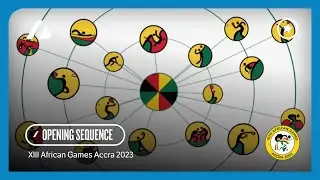Johannesburg 1999 All-Africa Games - Broadcast Opening Sequence
Copyright (c) 1999 African Union (AU)
South Africa has been keen in showcasing to the international community the country's new face - a Rainbow nation freed from apartheid, and just four years after staging and then winning the 1995 Rugby World Cup, Johannesburg welcomed about 25,000 visitors including 6,000 athletes and officials across Africa as the city plays host to the 7th iteration of the All-Africa Games - now known today as the African Games. Held from 10 to 19 September 1999, the Johannesburg Games featured 18 sports, including netball, which served as a demonstration sport in the event.
There were, however, some typical problems before and during the event. 600 children had contracted food poisoning after being fed boxed lunches at the practice session for the Games' opening ceremonies; there has been striking laborers demonstrating outside Games venues; the women's field hockey tournament was demoted into a non-medal event after Nigeria dropped out; and a brawl occurred during a basketball match between Angola and Egypt, forcing police to escort the Egyptian team from the court.
Supposedly, the infrastructural legacy of Johannesburg 1999 was mainly centered on the development of the athletes’ village in the township of Alexandra, a black urban area created by the separate development policies of the former apartheid state. Despite significant investment, the village did not lead to substantial improvements in the overall deprivation of Alexandra, and that legacy was largely forgotten to this day.
Despite the difficulties that the hosts experience and had to face, then-IOC President Juan Antonio Samaranch praised South Africa's hosting gig, stating "this shows that you can organize big events." Although Cape Town fell short in getting the 2004 Olympics following the IOC's election of Athens in 1997, South Africa was hoping that the Johannesburg Games would give a boost to the nation's bid for the 2006 FIFA World Cup; it eventually lost to Germany, but South Africa - in 2004 - went on to bid and get the hosting rights for the 2010 Cup, a tournament that's locked in for Africa to host as part of a short-lived rotation policy by FIFA to rotate the World Cup among football confederations (the policy, however, was shelved in 2007).































